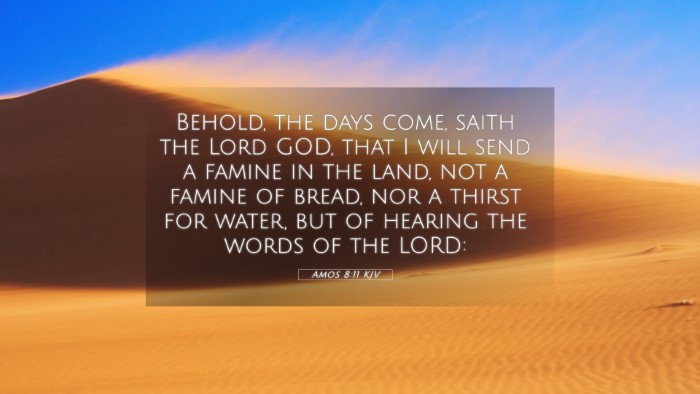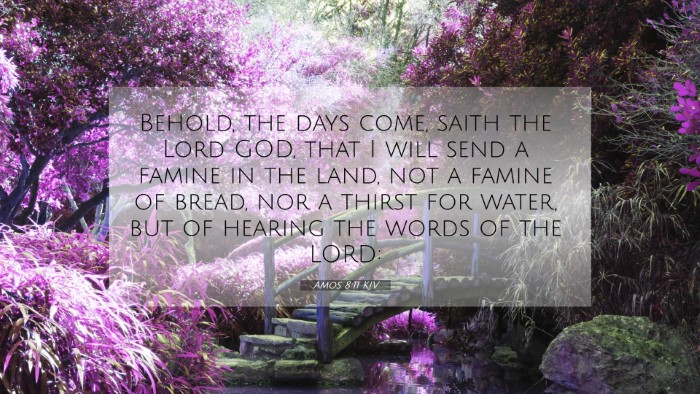Old Testament
Genesis Exodus Leviticus Numbers Deuteronomy Joshua Judges Ruth 1 Samuel 2 Samuel 1 Kings 2 Kings 1 Chronicles 2 Chronicles Ezra Nehemiah Esther Job Psalms Proverbs Ecclesiastes Song of Solomon Isaiah Jeremiah Lamentations Ezekiel Daniel Hosea Joel Amos Obadiah Jonah Micah Nahum Habakkuk Zephaniah Haggai Zechariah MalachiAmos 8:11 Similar Verses
Amos 8:11 Cross References
Behold, the days come, saith the Lord GOD, that I will send a famine in the land, not a famine of bread, nor a thirst for water, but of hearing the words of the LORD:
Uncover the Rich Themes and Topics of This Bible Verse
Listed below are the Bible themes associated with Amos 8:11. We invite you to explore each theme to gain deeper insights into the Scriptures.
Amos 8:11 Cross Reference Verses
This section features a detailed cross-reference designed to enrich your understanding of the Scriptures. Below, you will find carefully selected verses that echo the themes and teachings related to Amos 8:11 KJV. Click on any image to explore detailed analyses of related Bible verses and uncover deeper theological insights.
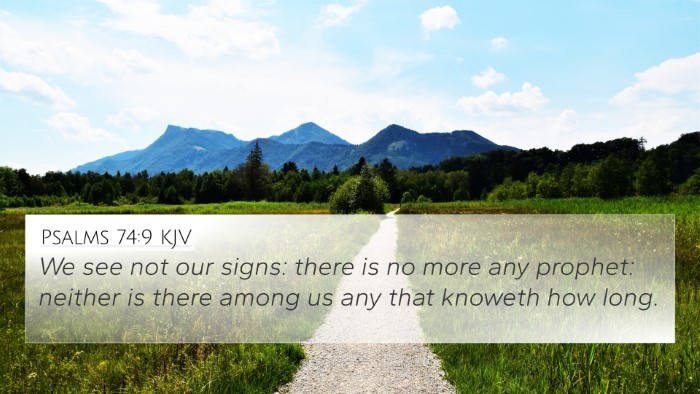
Psalms 74:9 (KJV) »
We see not our signs: there is no more any prophet: neither is there among us any that knoweth how long.
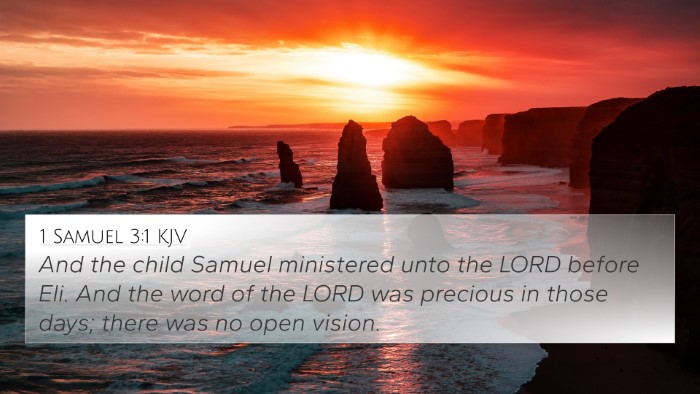
1 Samuel 3:1 (KJV) »
And the child Samuel ministered unto the LORD before Eli. And the word of the LORD was precious in those days; there was no open vision.
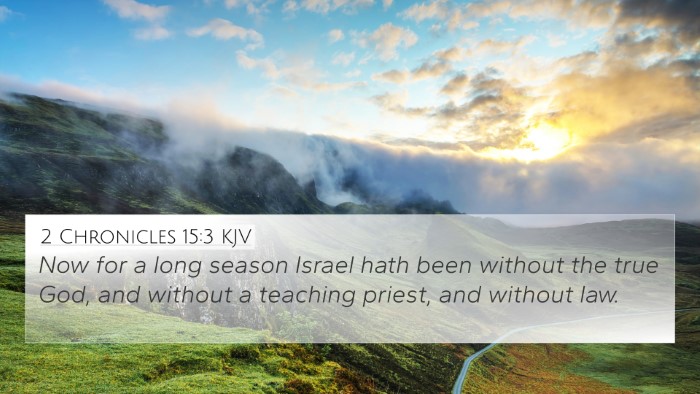
2 Chronicles 15:3 (KJV) »
Now for a long season Israel hath been without the true God, and without a teaching priest, and without law.
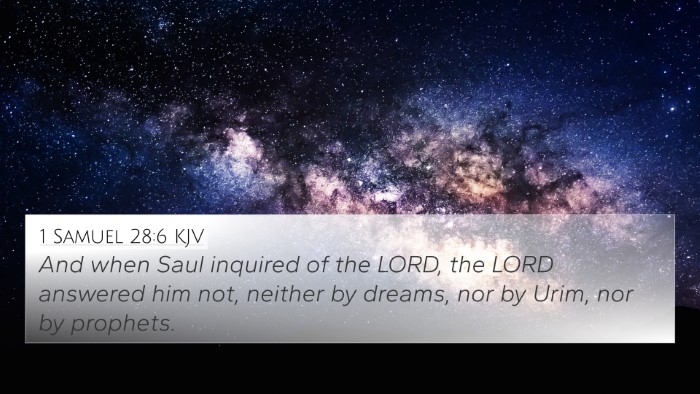
1 Samuel 28:6 (KJV) »
And when Saul inquired of the LORD, the LORD answered him not, neither by dreams, nor by Urim, nor by prophets.
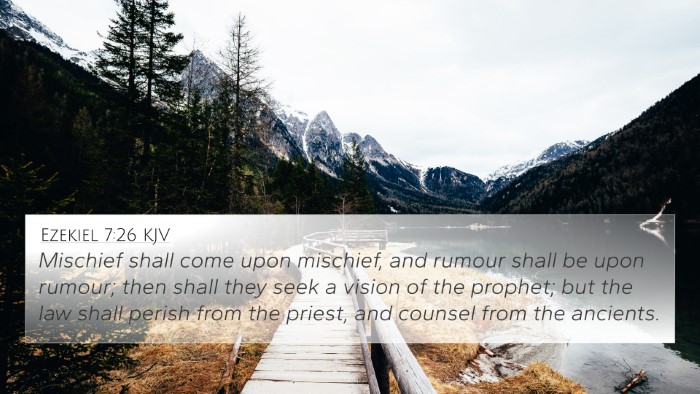
Ezekiel 7:26 (KJV) »
Mischief shall come upon mischief, and rumour shall be upon rumour; then shall they seek a vision of the prophet; but the law shall perish from the priest, and counsel from the ancients.
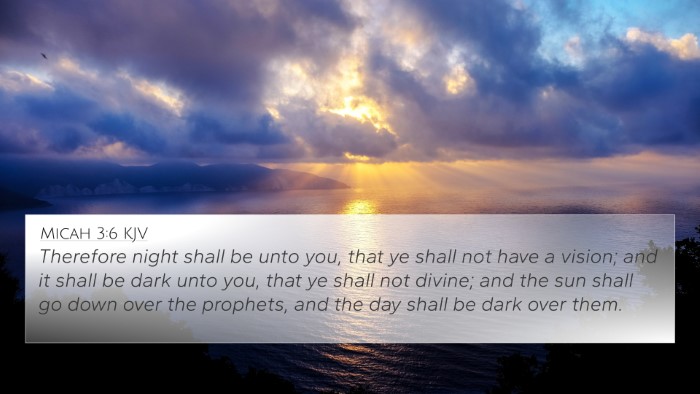
Micah 3:6 (KJV) »
Therefore night shall be unto you, that ye shall not have a vision; and it shall be dark unto you, that ye shall not divine; and the sun shall go down over the prophets, and the day shall be dark over them.

Isaiah 5:6 (KJV) »
And I will lay it waste: it shall not be pruned, nor digged; but there shall come up briers and thorns: I will also command the clouds that they rain no rain upon it.
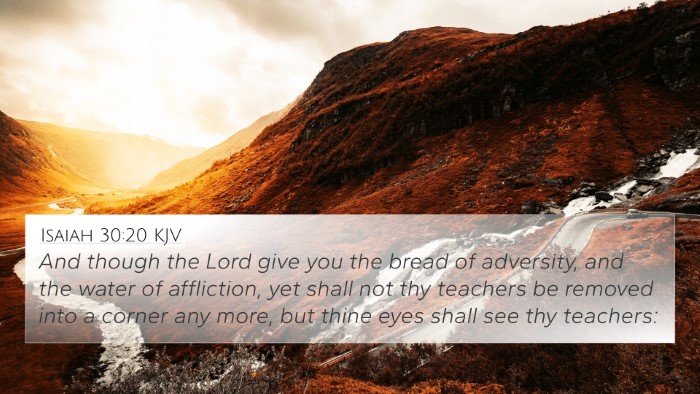
Isaiah 30:20 (KJV) »
And though the Lord give you the bread of adversity, and the water of affliction, yet shall not thy teachers be removed into a corner any more, but thine eyes shall see thy teachers:
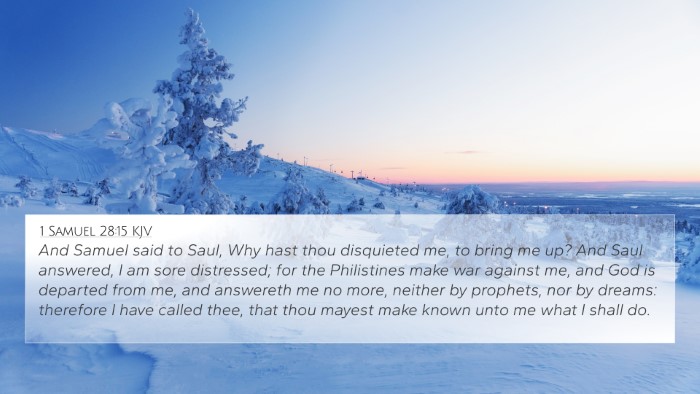
1 Samuel 28:15 (KJV) »
And Samuel said to Saul, Why hast thou disquieted me, to bring me up? And Saul answered, I am sore distressed; for the Philistines make war against me, and God is departed from me, and answereth me no more, neither by prophets, nor by dreams: therefore I have called thee, that thou mayest make known unto me what I shall do.
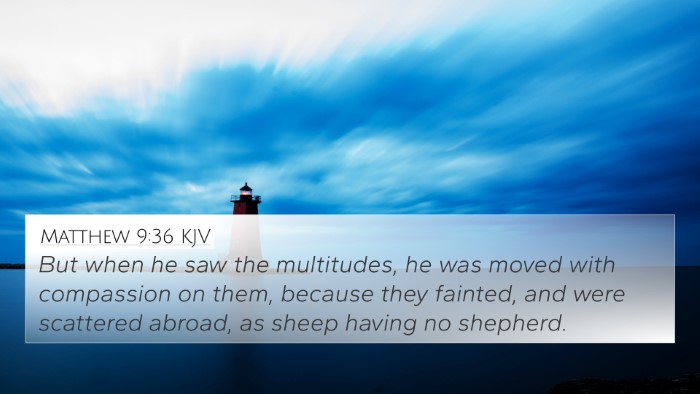
Matthew 9:36 (KJV) »
But when he saw the multitudes, he was moved with compassion on them, because they fainted, and were scattered abroad, as sheep having no shepherd.
Amos 8:11 Verse Analysis and Similar Verses
Understanding Amos 8:11
Amos 8:11 reads: "Behold, the days come, saith the Lord God, that I will send a famine in the land, not a famine of bread, nor a thirst for water, but of hearing the words of the Lord."
This verse speaks to a profound spiritual hunger and a divine judgment. It indicates a time when God's revelation will be scarce, which is a stark warning against complacency and apostasy. Below, we explore the insights from various public domain commentaries on this critical scripture.
Commentary Insights
Matthew Henry’s Commentary
Matthew Henry emphasizes that the famine referenced in Amos is not physical but spiritual. He asserts that the deprivation of the Word of God is far more serious than any material lack. This scarcity leads to a desperate longing among the people, who will search for the Lord's words but will not find them. Henry highlights that this reflects the severity of God's anger at Israel's disobedience and idolatry.
Albert Barnes’ Notes on the Bible
Albert Barnes points out that the prophecy signifies a time of divine silence where God’s messages will be withheld due to the people's persistent sin. He underscores that spiritual famine is detrimental, prompting a yearning for the once-plentiful divine guidance. This void in prophetic utterances signifies a severe judgment upon the nation, indicating that despite their material abundance, they will be spiritually bankrupt.
Adam Clarke’s Commentary
Adam Clarke elaborates that such a famine signifies God’s rejection. He notes that the people of Israel, once blessed with the knowledge of God, will face a void that will lead them to wander from sea to sea in search of a prophetic word. Clarke suggests that this passage serves as a caution to future generations about the significance of heeding God’s voice, signifying that neglecting it can result in spiritual desolation.
Bible Verse Cross-References
Amos 8:11 can be connected to several other scriptures, enhancing the understanding of its themes and implications:
- 1 Samuel 3:1: "And the word of the Lord was rare in those days." - This reflects a similar theme of scarcity of divine revelation.
- Lamentations 2:9: "Her gates are sunk into the ground; He has destroyed and broken her bars; Her king and her princes are among the nations; The law is no more, and her prophets find no vision from the Lord." - Emphasizing the absence of prophetic vision.
- Ezekiel 7:26: "Disaster will come upon disaster, and rumor will be upon rumor; then they will seek a vision from a prophet, but the law will perish from the priest and counsel from the elders." - Illustrating a prophetic silence during calamity.
- Matthew 4:4: "But he answered, 'It is written, Man shall not live by bread alone, but by every word that comes from the mouth of God.'" - Emphasizing the need for spiritual nourishment over physical sustenance.
- Micah 3:6: "Therefore night shall be to you without vision, and it shall be dark unto you, that ye shall not divine; and the sun shall go down over the prophets, and the day shall be dark over them." - Another reflection on the absence of prophetic insight.
- Hebrews 1:1-2: "God, who at various times and in various ways spoke in time past to the fathers by the prophets, has in these last days spoken to us by His Son..." - A contrast to divine silence, showing God’s continued communication.
- Psalm 119:130: "The entrance of Your words gives light; It gives understanding to the simple." - Highlighting the importance of God's word in providing insight and wisdom.
Thematic Connections
This verse opens various themes commonly explored in biblical studies and spiritual discussions:
- The Importance of Divine Revelation: Understanding that spiritual insight is as crucial as physical sustenance.
- The Consequence of Sin: Recognizing that turning away from God leads to a silence that can afflict entire nations.
- The Search for God: The desperation that arises when divine guidance is lost, indicating a universal need for spiritual nourishment.
- God’s Judgment: The implications of divine retribution for disobedience and forsaking His statutes.
- The Role of Prophets: Understanding the significance of prophetic voices in guiding and warning God’s people.
Cross-Referencing Biblical Texts
This verse is crucial for anyone interested in exploring cross-references within the Bible. The method of cross-referencing allows for the identification of thematic parallels and doctrinal consistency across different scriptures. By examining Amos 8:11 alongside the referenced verses, readers can gain a deeper understanding of both God’s nature and the spiritual state of humanity.
Utilizing tools for cross-referencing, such as a Bible concordance or a cross-reference Bible study guide, can help in finding and understanding connections between various Bible verses. This practice enriches the study of scripture, allowing believers to see the broader narrative of God’s relationship with humanity.
As you engage in cross-referencing Bible study methods, consider the following:
- Identify specific themes, such as divine silence and the longing for God's word.
- Explore comparative studies between prophetic books and the fulfillment of their messages in the New Testament.
- Utilize inter-Biblical dialogue to discover how past prophecies resonate with contemporary revelations.
- Engage in thematic Bible verse connections that reveal the overarching narrative of redemption and judgment.
Conclusion
Amos 8:11 stands as a poignant reminder of the necessity for God’s word in the lives of believers. The warnings it encapsulates resonate through centuries of scripture, encouraging a diligent pursuit of divine truth and an understanding of God’s character, especially in times of spiritual desolation. Through thoughtful cross-referencing and thematic exploration, Christians can draw from the rich insights of the Bible to deepen their faith and navigate their spiritual journeys.

